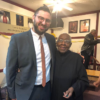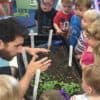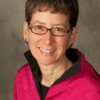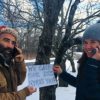Rabbi Nate DeGroot gave the following sermon at St. John’s Evangelist Temple of Truth in Detroit, MI on Sunday, June 16, 2019, right next to Oakland Avenue Urban Farm, one of Hazon Detroit’s main partners. Jerry Hebron, Executive Director and Founder of Oakland Avenue Farm grew up at this church, as her mom has been the Reverend there for decades. Rabbi DeGroot’s sermon served as an invitation to Hazon Detroit’s Breaking Bread Together program happening Sunday, June 23, and was teaching about the role of bread and breaking bread together within the Jewish tradition. Good morning! And thank you all so much for having me here. My name is Rabbi Nate DeGroot and it is truly an honor to be here with you. Reverend Carter, I want to thank you for welcoming me so warmly into this beautiful community To join with you in praise this morning And to offer some words of Torah, some words of Jewish teaching from my tradition. Jerry, I’d also like to thank you for connecting me with your mom, and for being such a meaningful support and advocate for me this year. I stand here today with you as a representative of Hazon Detroit, […]











